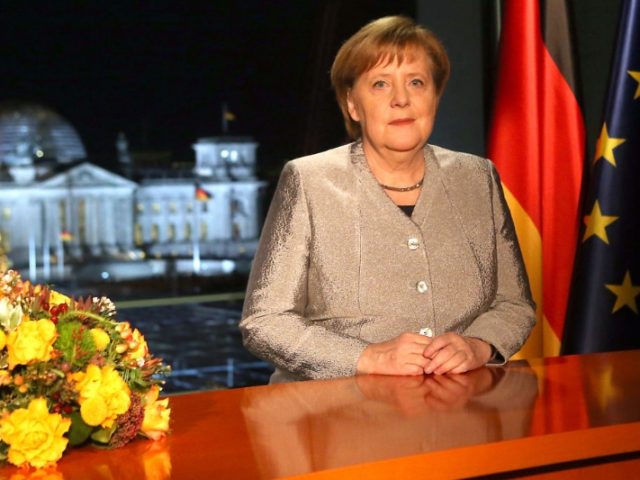Chancellor Angela Merkel has closed a difficult year in German politics which has seen political embarrassment at the polls and her own departure from the top job announced but deferred, with an address to the nation pushing key globalist themes.
Speaking in her annual New Year’s Eve address recorded on Sunday, the architect of Europe’s migrant crisis made oblique swipes at nationalism and called for more cooperation “across borders” to tackle what she identified as the key challenges of 2019, among them terrorism and global warming.
Inevitably German Chancellor Angela Merkel’s comments on mass migration gathered much attention in the domestic press, with Deutsche Welle reporting her having identified “governance and order of migration” as an issue to be addressed. Dr Merkel said: “We will only master the challenges of our time if we stick together and work together with others across borders.”
Her comments were clear references to the UN Migrant pact and the difficult relationship between globalist Germany and Presdient Trump’s America first policies. The UN compact, conceived in the wake of the migrant crisis Angela Merkel helped create and was subsequently revealed to have been launched with much assistance and encouragement from the German government.
The compact, which has now been adopted by the UN and most member states would have the impact of making the open-borders policies pursued by the Merkel government the status-quo the world over, with the likely impact of reducing migratory pressures on Germany itself by shifting human traffic to other nations.
The implications of the compact were realised after the text of the agreement had been reached in 2017, with President Donald Trump leading the United States out of the UN plan for migration. Emboldened by that action, several other states including Australia, Israel, Austria, and Hungary also withdrew.
The timing of Merkel’s remarks are significant. New Year’s Eve celebrations became perhaps indelibly associated with the migrant crisis Dr Merkel unleashed upon Europe in 2015, when mass sexual assaults took place in a number of German cities, most notably Cologne.
While the attacks, which saw over 1,000 criminal complaints of rape, sexual assault, and theft were played down by police and initially not reported in German media they later caused a significant scandal and gained global attention. Protests that took place after the attacks clearly featured large numbers of protest signs associating Merkel’s leadership with migrant crime and sex assaults, and the chant ‘Merkel Must Go’ became common at demonstrations.
Speaking at odds with reality as many will perceive it, the Chancellor was also at pains to emphasise in her New Year’s speech that per difficult year politically, highlighted by internal party struggles over migration politics and with a number of poor elections results, was not actually the reason for Dr Merkel announcing her forthcoming departure from Germany’s top job.
Instead of the series of votes in Hesse, Bavaria, and the national election in 2017 which took six months to form a working government from, Dr Merkel insisted she was planning on announcing her departure all along. Her 13 year leadership had already been long enough, she said, and would have stepped down “regardless of how unsatisfactory the past year was”.
Rather than leaving immediately, however, Merkel has announced her intention to stay on as Chancellor — although she has already been replaced as leader of her party — until 2021, effectively preventing a coup against herself while extending her leadership until the last possible moment.
Merkel’s speech will be broadcast in full Monday evening.

COMMENTS
Please let us know if you're having issues with commenting.